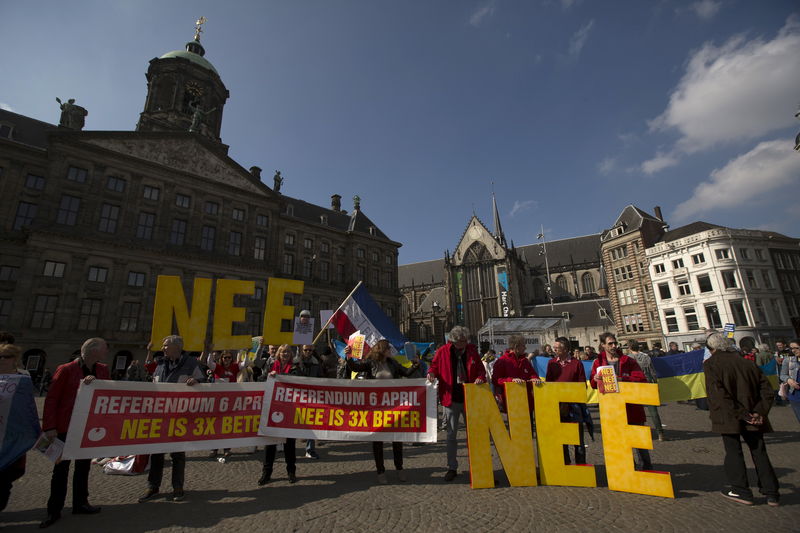By Anthony Deutsch and Thomas Escritt
AMSTERDAM (Reuters) - Dutch voters will decide on Wednesday whether to support a European treaty deepening ties with Ukraine in a referendum that will test sentiment towards Brussels ahead of Britain's June Brexit vote and could also bring a boost for Russia.
The broad political, trade and defence treaty is already provisionally in place but has to be ratified by all 28 European Union member states for every part of it to have full legal force. The Netherlands is the only country that has not done so.
While a "no" vote in the non-binding referendum would not force the Dutch government to veto the treaty on an EU level the fragile coalition, which holds the rotating EU presidency, might find it hard to ignore with less than a year to general elections.
Any rejection by Dutch voters or by the government would give Russian President Vladimir Putin, who opposes deeper EU-Ukraine ties and who many Dutch blame for the downing by pro-Russian rebels of a plane travelling from Amsterdam, a victory in his war of words with the West.
An EU decision to push on with the treaty despite a "no vote", whether the government respects it or not, could be damaging for the EU and highlight EU problems ahead of the British vote.
"If politicians ignore the Dutch no then it will be an even stronger signal than what the British have already received that there is no way to correct the European political class and that they should vote to leave," said Thierry Baudet, a "no" campaigner and one of the architects of the referendum that was triggered when activists gathered thousands of signatures of support.
Many Dutch feel they are being asked to choose between two unattractive options: EU expansion plans dreamed up by unaccountable bureaucrats in Brussels or helping Russian Putin who they blame for the MH17 plane disaster which killed almost 200 Dutch citizens in July 2014.
TURNOUT CRUCIAL
Others are confused by the issues.
"I'm not voting," said Gijs, a driving instructor in Amsterdam. "I can't understand what this referendum is about, and I can't understand why it was called."
A poll by Maurice De Hond on Sunday forecast that 66 percent of people certain to vote, would back 'No' with only 25 percent in favour, with turnout likely to be decisive in shaping the final result. Pollsters TNS Nipo have forecast turnout of 32 percent, just above the 30 percent threshold that is needed for the referendum to be valid.
The government, which supports a "yes" vote, fears it could turn into a protest vote like in 2005, when a majority of the Dutch electorate broke from a pro-European tradition and rejected the EU constitution.
"I hope the Dutch can get over their chagrin and say: 'Yes, we are annoyed with Europe, we are annoyed with this Dutch government, but we will still support Ukraine," said Dutch Finance Minister Jeroen Dijsselbloem.
While some parliamentary parties have said they would be bound by the outcome, "the government position is that we will follow the law, which simply says we will reconsider," said Dijsselbloem, lending weight to the view that the government will seek to preserve the treaty, or its essence, whatever the outcome.
"PUTIN'S SHADOW"
The government itself shied away from framing the vote in a Russian context but shifted tactic as the referendum approaches.
The youth wing of Dijsselbloem's Labour Party, the junior party in the ruling coalition of Prime Minister Mark Rutte, have run a poster campaign showing anti-EU populist Geert Wilders passionately kissing Putin.
"Vladimir Putin's shadow is lurking fairly significantly over this treaty," said "yes" campaigner Joshua Livestro, arguing that a "no" vote will play into Putin's hands.
"Are we now going to give Putin what he wants after all?" he said.
Prime Minister Mark Rutte's cabinet initially stressed the treaty's economic benefits, but has since focused on its importance for Ukrainian reform in the areas of corruption, human rights and democracy.
"Everyone who wants progress in Ukraine is asking us to vote 'yes,' along with 27 other countries. That's what the referendum is about and nothing else," Deputy Prime Minister Lodewijk Asscher said on Friday.
"No" campaigners say the treaty is a first step toward full EU membership. "Legal scholars call it quasi membership," said Baudet.
Many Ukrainian politicians feel their country deserves the treaty and are keen to show they have made progress in aligning their country with EU standards since the 2014 uprising that toppled pro-Russian president Viktor Yanukovich.
In a Dutch television interview on Sunday, Foreign Minister Pavlo Klimkin emphasized progress in areas such as gay and transgender rights where the Dutch have always viewed themselves as progressive leaders.

"In the past 24 months since Maidan we've done more reforms than in the last 24 years," he said.